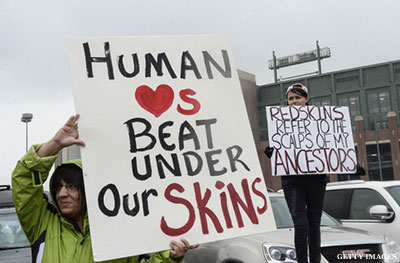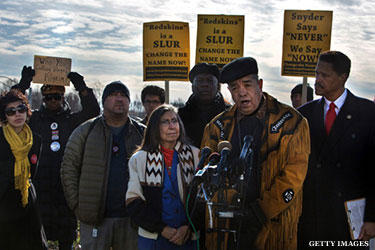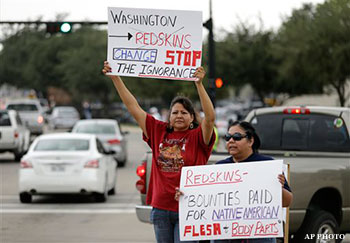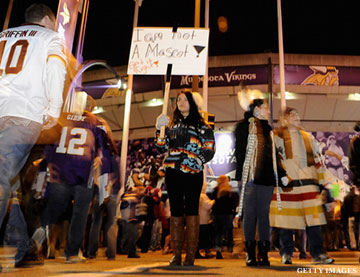When a Pennsylvania student newspaper published an editorial in October condemning the school's nickname of "Redskins," the reaction was not exactly warm.
"It was scary," said Emily Scott, 18, op-ed editor for The Playwickian at Neshaminy High School in Langhorne, Pa. "I witnessed people ripping it up and found it crumpled up in the hallways."
The newspaper staff's pledge to keep the word "Redskin" out of its pages sparked lots of debates in class, and it soon gained widespread coverage in USA Today, The Philadelphia Inquirer, the Huffington Post and other major media outlets. In Washington D.C., Jacqueline Pata, executive director of the National Congress of American Indians, followed the story and took an interest.
"We're just so proud of the school in Pennsylvania that stepped up in such a large way as they did," Pata told ThePostGame. "They're non-natives. They decided it just felt uncomfortable."
The NCAI's "Proud To Be" commercial is intended to make those who continue to support the use of Redskins as a team name uncomfortable as well. Released on YouTube just before the Super Bowl, the two-minute commercial aimed at getting the Washington Redskins to change their name has received nearly 2 million views. Now a 60-second version is set to air during Game 3 of the NBA Finals on Tuesday night on ABC.
"That term itself is different than any other team name because it is already a recognized racial slur," Pata said of Redskins. "This isn't one that you can pass off as being represented over and over again. It was recognized in 1860 as being a term that was derogatorily used."
The October 2013 NCAI report, "Ending the Legacy of Racism in Sports & the Era of Harmful 'Indian' Sports Mascots," reads, "The term [Redskins] originates from a time when Native people were actively hunted and killed for bounties, and their skins were used as proof of Indian kill."
In April 2013, 62 high schools in 22 states used the nickname Redskins, according to Capital News Service Maryland. But in the past 25 years, 28 high schools in 18 states had dropped Redskins as the mascot.

Debate about the Washington Redskins has been the most volatile about using Native American nicknames in sports, partly because it is the NFL and partly because the team is in the nation's capital. But where is the line drawn between what is and is not acceptable among Native American sports teams?
Like Pata, Jack Kohler, a filmmaker working on a documentary on Stanford's change from Indians to Cardinal, considers the term Redskins historically racist. "To the [U.S.] military, it often meant they were dead and on the ground with blood on them," he said.
Although the Cleveland Indians "demoted" their long time caricature logo Chief Wahoo this season, Kohler questions if it is enough. "Indians" itself crosses the line, said Kohler, who has Hoopa, Yuron and Karuk ancestry.
"We're not really Indians," he said. "Columbus got lost and thought he was in India and called us Indians."
Names such as Braves, Warriors and Chiefs do not bother Kohler as much as Redskins and Indians. He notes these names do not depict a specific race of people. For example, warriors could refer to groups such as the Greeks or Romans, and Chiefs can refer to police or fire chiefs.
Kohler, who was a freshman at Stanford the year after it stopped using Indians as its nickname, scoffed at the depiction. The Stanford Indian mascot looked more like a "Plains Indian" than a native to the Bay Area of California.

"It's like John Wayne movies," he said. "They always used Plains Indians as the bad guys. There's 558 different tribes across the nation and we all dress differently."
Tribe names do not bother Kohler if used respectfully. The Florida State Seminoles come close to that line through their logo and mascot. While the Seminoles are native to northern Florida and approve of the name, Kohler is disgusted by the Plains Indian depiction.
"It doesn't bother me the Seminoles are letting them use their name. It's not a derogatory name. It represents a small group of people in Florida," Kohler said. "I don't necessarily agree they should ride on a horse in full regalia."
From an official stance, Pata expresses a similar viewpoint, but she is hesitant to draw a line. In her experiences communicating with the Seminole tribe in particular, the tribe has expressed no concern of Florida State's use of the mascot. Pata does not think it is her place to force anything upon the tribe.
"I don't see us as being the judge and jury on these issues," she said. "Our goal is not to be the arbitrator of what's offensive and what's not."
Sometimes the toughest part of the struggle is just getting people to understand the historical context. Kohler recalls an incident when his daughter was 6, and the family ate in a Burger King in Napa, Calif. A group of teenagers from a rival of Napa High School walked in. The students were wearing shirts with a depiction of a steamroller flattening Indians, the namesake for Napa High School's athletic teams. Above the bloody bodies read, "Crush the Indians."

"My wife went over and sat next to them," Kohler said. "She said, 'What does that mean on your shirt?' And she pointed over to where my daughter and I were sitting, and she said, 'You see that little girl?' She said, 'Why are they killing all the Indians?'"
The teenagers claimed the shirts were part of their spirit day and they did not even know Native Americans were still around.
Carly, now 23, remembers her mother being very upset by that. Like her dad, she went to Stanford and became involved its Native American Cultural Center and was an RA for Muwekma, Stanford's Native American/Alaska Native/Native Hawaiian-themed house. She was among a group of students to travel with native staff members to fraternity houses and other student groups to discuss the sensitivity of Native Americans.
"We always said the point isn't to change anyone's mind, but to start talking about it," she says. "We didn't want to approach it as if you'd have to change your mind, because we didn't think it would work. But we wanted to show we're your classmates and this is how we feel about it."
Now pursuing a master's degree in social work at San Francisco State University, Kohler is not over the nickname/mascot issue. Unlike her father, Carly thinks the line should be drawn to keep tribe names out of sports. She does not trust those who root for the teams to truly understand the meanings of such names.

"Personally, I don't support any tribe becoming a mascot because there's too much ignorance about Native Americans," she said. "I don't feel comfortable with those names. Maybe 50 years from now, if people get educated on the issues, maybe that's something we can do.
"We were conquered people, so we don't have a voice. I want people to understand native people are alive and well, and there are religions and spiritual ceremonies that are not to be mocked."
In the 1920s, St. John's University in New York adopted the name "Redmen" in reference to the football team's red uniforms. Over time, the name took on a Native American connotation and a warrior-like mascot was adopted.
Under pressure from Native American groups and the changing intercollegiate culture, St. John's rebranded itself as the "Red Storm" in 1993.
"Being a leading educational institution in the United States and one of the largest Catholic schools, it was a 'live by what we preach' thing," says Edward Manetta, Jr., St. John's associate vice president and director of athletics from 1995-2001.
Manetta, a 1977 graduate of St. John's, believes the nickname was not meant to be derogatory in principle, but the meaning became misinterpreted. As relations got more sensitive the name and mascot had to go.

"It's like everything. You have to understand the sensitivities of nationalities and cultures. Nothing can be mocking in any way. It has to be respectful," he says.
While professional sports have been rather slow on the name changes, collegiate programs like Stanford and St. John's have responded. Manetta, now the Director of Sports Programming for Barclays Center in Brooklyn, says Native American names will "never be an issue again" at the collegiate level.
In a letter to Washington Redskins' fans in October, team owner Dan Snyder wrote the name "was, and continues to be, a badge of honor. ... I've listened carefully to the commentary and perspectives on all sides, and I respect the feelings of those who are offended by the team name. But I hope such individuals also try to respect what the name means, not only for all of us in the extended Washington Redskins family, but among Native Americans too."
Last month, 50 U.S. Senators urged NFL commissioner Roger Goodell change the Washington Redskins' name, calling it a racist slur. Team president Bruce Allen responded with a letter to Senate Majority Leader Harry Reid that said the team name is "respectful" to Native Americans. The team then asked its fans to tweet support of the name to Reid, but the tone-deaf move backfired.
-- Follow Jeffrey Eisenband on Twitter @JeffEisenband.




